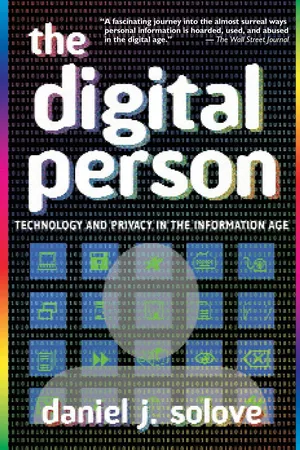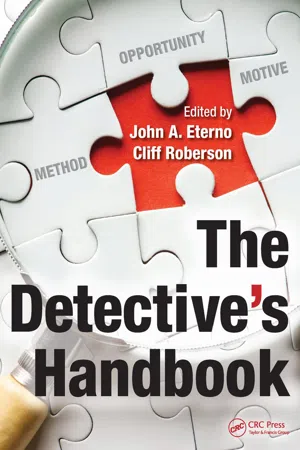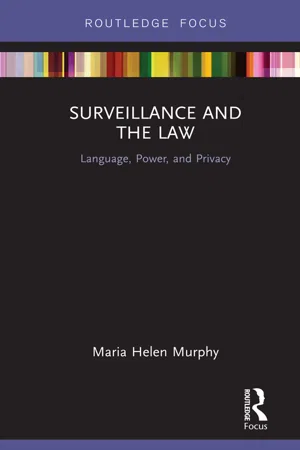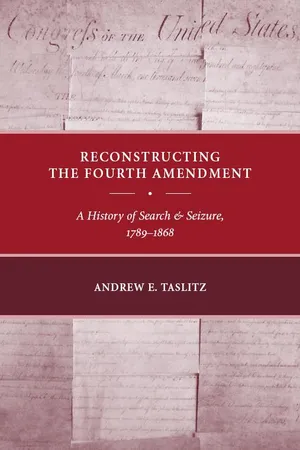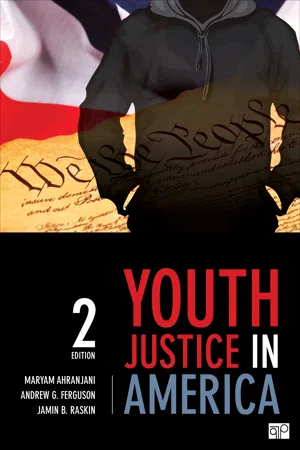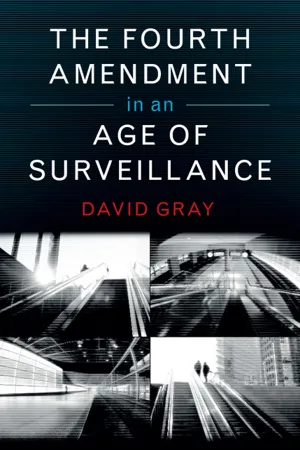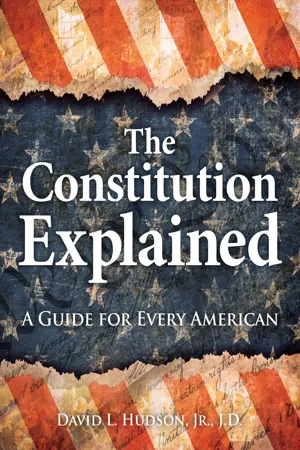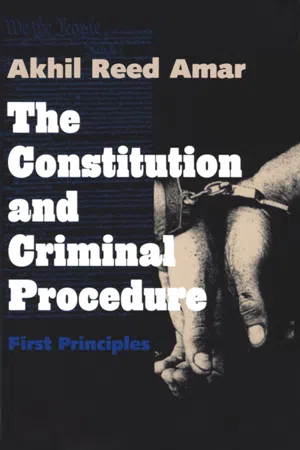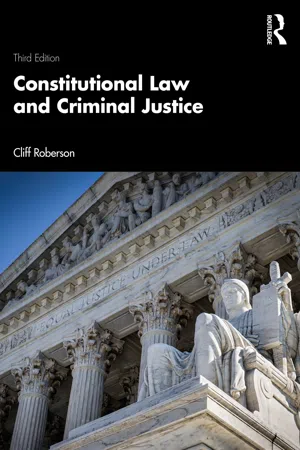Politics & International Relations
4th Amendment
The 4th Amendment to the United States Constitution protects citizens from unreasonable searches and seizures by the government. It requires that search warrants be issued only upon probable cause and that they specifically describe the place to be searched and the persons or things to be seized. The amendment is a crucial component of the constitutional protection of individual privacy and civil liberties.
Written by Perlego with AI-assistance
Related key terms
1 of 5
11 Key excerpts on "4th Amendment"
- eBook - ePub
The Digital Person
Technology and Privacy in the Information Age
- Daniel J Solove(Author)
- 2004(Publication Date)
- NYU Press(Publisher)
10 The Fourth Amendment, Records, and PrivacyThe Architecture of the Fourth Amendment
The Purposes and Structure of the Fourth Amendment. For better or for worse, we currently regulate law enforcement in the United States with a constitutional regime, comprised primarily by the Fourth, Fifth, and Sixth Amendments. A significant part of this regime applies to government information gathering. The Fifth Amendment affords individuals a privilege against being compelled to testify about incriminating information. The Fourth Amendment regulates the government’s power to obtain information through searches and seizures. Specifically, the Amendment provides:The right of the people to be secure in their persons, houses, papers, and effects, against unreasonable searches and seizures, shall not be violated, and no warrants shall issue, but upon probable cause, supported by oath or affirmation, and particularly describing the place to be searched, and the persons or things to be seized.1Although the Fourth Amendment applies to government activity in both the civil and criminal contexts,2 it is limited to activities that constitute “searches” and “seizures.” Certain activities, such as seeing things exposed openly to public view, are not searches.3 The Fourth Amendment only governs searches where an individual has “a reasonable expectation of privacy.”4If the Fourth Amendment applies, a search or seizure must be “reasonable.” Although technically the two clauses of the Fourth Amendment are separate, the Court has interpreted the requirement that a search or seizure be reasonable as related to the warrant requirement. To obtain a warrant, the police must demonstrate to a neutral judge or magistrate that they have “probable cause,” which means they must provide “reasonably trustworthy information’ that the search will reveal evidence of a crime.5 Generally, searches and seizures without a warrant are per se unreasonable—which means that they are deemed invalid.6 This has become known as the “per se warrant rule.”7 - eBook - PDF
- John A. Eterno, John A. Eterno, Cliff Roberson(Authors)
- 2017(Publication Date)
- Routledge(Publisher)
6 Thomas Jefferson in turn relied heavily on the Virginia Declaration of Rights in drafting the Declaration of Independence. 2 Legal Overview of the Fourth Amendment One of the strengths of the U.S. Constitution and a factor that has given it the flexibility to adapt to changing times is the general nature of its statements. Because subsequent judicial review and interpretation have created many of the constitutionally based legal principles followed today, an examination of the legal aspects of the Fourth Amendment invariably must consider the historical context of the text and its origins, blurring the lines between historical and legal overviews. The Fourth Amendment itself comprises only 54 words: The right of the people to be secure in their persons, houses, papers, and effects, against unreasonable searches and seizures, shall not be violated; and no Warrants shall issue but upon probable cause, supported by Oath or affirmation, and particularly describing the place to be searched, and the persons or things to be seized. 7 Taken at face value, those words seem straightforward enough. Historians generally agree that this amendment was intended to affirm the rulings in both Entick and Wilkes , as well as to reject the outcome of a 1760 case in Boston in which a group of 50 merchants 318 The Detective’s Handbook represented by James Otis filed suit to overturn the writs of assistance issued in the name of King George III—and lost. The basic principles were that the government should not conduct a search of private property without substantial justification, that the objects of any such search should not go beyond that justification, and that general warrants should not be used to evade these common law rights. It is also important, however, to consider what is not contained or implied here. First, the historical events that motivated the drafting of the Fourth Amendment did not involve conventional criminal acts—theft, murder, rape, and so on. - eBook - ePub
Surveillance and the Law
Language, Power and Privacy
- Maria Helen Murphy(Author)
- 2018(Publication Date)
- Routledge(Publisher)
2 Evolving technological standards, same basic rightsThe case of the Fourth Amendment
The power-limiting purpose of the Fourth Amendment
A rich source of interpretive debate in the surveillance context has been the Fourth Amendment of the US Constitution and the associated ‘third-party doctrine’. The Fourth Amendment affirms:The right of the people to be secure in their persons, houses, papers, and effects, against unreasonable searches and seizures, shall not be violated, and no Warrants shall issue, but upon probable cause, supported by Oath or affirmation, and particularly describing the place to be searched, and the persons or things to be seized.The Fourth Amendment limits executive power by requiring the following of ‘certain “judicial processes” to curb executive overreach’.1 According to the US Supreme Court, two basic guideposts are that the Fourth Amendment seeks to secure ‘the privacies of life’ against ‘arbitrary power’ and ‘to place obstacles in the way of a too permeating police surveillance’.2The Fourth Amendment is traditionally read to require the obtaining of a warrant on the basis of probable cause from a neutral and detached person before a search can take place. These procedural requirements have been described as not only serving to protect individual liberties, but also as sending ‘a message to the executive branch that no person or entity, including those wielding the most power in society’ is ‘above the law’.3 There are circumstances where a warrantless search may not be considered ‘unreasonable’, however, such as when the search is subsequent to an arrest, in hot pursuit, or in a foreign country.4 - eBook - PDF
- Glen Krutz, Sylvie Waskiewicz(Authors)
- 2021(Publication Date)
- Openstax(Publisher)
We saw earlier that perhaps it reflects James Madison’s broader concern about establishing an expectation of privacy from government intrusion at home. Another way to think of the Fourth Amendment is that it protects us from overzealous efforts by law enforcement to root out crime by ensuring that police have good reason before they intrude on people’s lives with criminal investigations. The text of the Fourth Amendment is as follows: “The right of the people to be secure in their persons, houses, papers, and effects, against unreasonable searches and seizures, shall not be violated, and no Warrants shall issue, but upon probable cause, supported by Oath or affirmation, and particularly describing the place to be searched, and the persons or things to be seized.” The amendment places limits on both searches and seizures: Searches are efforts to locate documents and contraband. Seizures are the taking of these items by the government for use as evidence in a criminal prosecution (or, in the case of a person, the detention or taking of the person into custody). In either case, the amendment indicates that government officials are required to apply for and receive a search warrant prior to a search or seizure; this warrant is a legal document, signed by a judge, allowing police to search and/or seize persons or property. Since the 1960s, however, the Supreme Court has issued a series of rulings limiting the warrant requirement in situations where a person can be said to lack a “reasonable expectation of privacy” outside the home. Police can also search and/or seize people or property without a warrant if the owner or renter consents to the search, if there is a reasonable expectation that evidence may be destroyed or tampered with before a warrant can be issued (i.e., exigent circumstances), or if the items in question are in plain view of government officials. - eBook - ePub
Reconstructing the Fourth Amendment
A History of Search and Seizure, 1789-1868
- Andrew E. Taslitz(Author)
- 2006(Publication Date)
- NYU Press(Publisher)
2. Likewise, the state′s power to search and seize is closely linked to First Amendment ideas of free expression and has historically too often been used to suppress dissent and difference.3. The Fourth Amendment aims at taming these and other aspects of state violence. The amendment arose not merely from a cold, rational theory of governance but from an experience of struggle animated by emotions of indignation, retribution, and the thirst for liberation. The relevance of those emotions for individuals and communities should not be ignored in the process of constitutional interpretation.4. The Fourth Amendment′s reference to a right of “the People” is not linguistic window dressing. The amendment′s protections are central to crafting a shared sense of peoplehood. Promoting involvement of an energized, monitorial People —a People with a real voice in how they are governed—in making the amendment′s promise real is best understood as an essential aspect of the amendment′s meaning.5. The amendment binds all three branches of government, and each must play a role in checking and balancing the others to prevent abuses of Fourth Amendment rights. For the courts, the warrant-issuing authority and the suppression hearing are essential tools for their properly playing their constitutional role.6. The probable-cause “requirement” embodies notions of individualized justice and the necessity for reliable proof as central tools for protecting the dignity and respect of individuals and groups and of the People and is not lightly to be trifled with.7. But the dignity and respect of individuals and groups, and the very existence of the American People, require protection from private violence and a state powerful enough to do so. However, there is presumptively little tension between the demands of individualized justice and of public safety. To the contrary, the best working assumption is that creative thinking can render these goals entirely compatible.7 - eBook - ePub
- Maryam Ahranjani, Andrew G. Ferguson, Jamin B. Raskin(Authors)
- 2014(Publication Date)
- CQ Press(Publisher)
Olmstead v. United States:The makers of our Constitution . . . sought to protect Americans in their beliefs, their thoughts, their emotions and their sensations. They conferred, as against the Government, the right to be let alone—the most comprehensive of rights and the right most valued by civilized men. To protect that right, every unjustifiable intrusion by the Government upon the privacy of the individual, whatever the means employed, must be deemed a violation of the Fourth Amendment.1The Fourth Amendment has two parts. First, it protects people from unreasonable searches and seizures of their persons, houses, papers, effects. Second, it requires search or arrest warrants be supported by particular facts and enough evidence to constitute probable cause.What is meant by “unreasonable searches and seizures”? The principle underlying the Fourth Amendment is that all people should be able to live their lives free from unreasonable interference, surveillance, or oversight. Friction arises when police and other law enforcement personnel need to investigate crimes and prevent unlawful behavior in society. So, on one hand, people want to have the liberty to do what they want, and, on the other hand, we all want to live in a safe society without criminal danger threatening us. To resolve this tension, courts have interpreted the Fourth Amendment to protect you against some searches and seizures but not others. The test is one of reasonableness. Reasonableness often requires the police to have a search warrant, though not always. There are times when the character of the situation renders a search reasonable even without a warrant.The Exclusionary Rule
Suppose you are prosecuted for the crime of threats for the comments in your journal. You now know that the Fourth Amendment gives you the right to be left alone in ordinary circumstances. Given the absence of a warrant and the presence of an unacceptable invasion of your room, you understand that the government has violated your rights. The question is: what should the penalty be for the government’s violation? One penalty might be exclusion. In order to deter the government from further misconduct, the journal could not be used as evidence against you. - David Gray(Author)
- 2017(Publication Date)
- Cambridge University Press(Publisher)
2 The Fourth Amendment in the Twentieth Century To the extent that some or all of the surveillance technologies and programs described in Chapter 1 seem like they are overreaching, unjustified, unreasonable, or even illegal, the next natural question is where we might look for some source of restraint. One obvious possibility would be the Fourth Amendment’s protections against “unreasonable searches and seizures.” Unfortunately, as this chapter explains, all of these technologies and programs are exempt from effective Fourth Amendment regulation under existing doctrine. To make a place for the Fourth Amendment in our age of surveillance will therefore require a revolution in Fourth Amendment law. When I teach the Fourth Amendment, students are gobsmacked to find out how limited is the scope of its protection. Like most relatively well-informed citizens who have the good fortune of living in middle- and upper-middle-class American society, they carry with them a sense that the Constitution provides protections that line up roughly with their instincts about things like liberty and justice, privacy and security. They are shocked to find out that Fourth Amendment doctrine runs quite contrary to many of their common intuitions. In a passage famous among professors who teach criminal procedure, Scott Sunby describes the basic state of affairs: To maintain privacy, one must not write any checks nor make any phone calls. It would be unwise to engage in conversation with any other person, or to walk, even on private property, outside one’s house. If one is to barbecue or read in the backyard, do so only if surrounded by a fence higher than a double-decker bus and while sitting beneath an opaque awning. The wise individual might also consider purchasing anti-aerial spying devices if available (be sure to check the latest Sharper Image catalogue). Upon retiring inside, be sure to pull the shades together tightly so that no crack exists and to converse only in quiet tones.- eBook - ePub
The Constitution Explained
A Guide for Every American
- David L. Hudson(Author)
- 2022(Publication Date)
- Visible Ink Press(Publisher)
The Fourth AmendmentThe right of the people to be secure in their persons, houses, papers and effects, against unreasonable searches and seizures, shall not be violated, and no Warrants shall issue, but upon probable cause, supported by Oath or affirmation, and particularly describing the place to be searched, and the persons or things to be seized.If you ask Americans what right they cherish the most, some may answer freedom of speech, because they like to speak their minds. Others who are religious likely will refer to freedom of religion. However, a good number of people may emphasize the right to privacy—specifically in their home. If they are more well versed in constitutional lingo, they might even mention the right to be free from unreasonable searches and seizures. That’s right, the Fourth Amendment is one of the most cherished individual freedoms in the Bill of Rights. Justice Louis Brandeis (1856–1941) once wrote in a dissenting opinion back in 1928 that this freedom is “the right to be let alone— the most comprehensive of rights and the right most valued by civilized men.”The Framers appreciated this right, as they or people they knew had experience with British officials searching their goods or materials with broad, fishing-expedition types of warrants called writs of assistance. British officials sought these writs of assistance to make sure that the colonists were not avoiding import duties and smuggling in materials without paying taxes. The first legal challenge brought against such writs of assistance was in 1761 in Boston, Massachusetts. A lawyer named James Otis Jr. (1725–1783) waxed eloquent in his language against the dreaded writs:I will to my dying day oppose, with all the powers and faculties God has given me, all such instruments of slavery on the one hand, and villainy on the other, as this writ of assistance is. It appears to me … the worst instrument of arbitrary power, the most destructive of English liberty, and the fundamental principles of the constitution, what was ever found in an English-law book. - eBook - PDF
The Constitution and Criminal Procedure
First Principles
- Akhil Reed Amar(Author)
- 2008(Publication Date)
- Yale University Press(Publisher)
Fourth Amendment First Principles The right of the people to be secure in their persons, houses, papers, and effects, against unreasonable searches and seizures, shall not be violated, and no Warrants shall issue, but upon probable cause, supported by Oath or affirmation, and particu-larly describing the place to be searched, and the persons or things to be seized. The Fourth Amendment today is an embarrassment. Much of what the Supreme Court has said in the last half-century—that the amendment generally calls for warrants and probable cause for all searches and seizures, and exclusion of illegally obtained evidence—is ini-tially plausible but ultimately misguided. As a matter of text, history, and plain old common sense, these three pillars of modern Fourth Amend-ment case law 1 are hard to support; in fact, today's Supreme Court does not really support them. Except when it does. Warrants are not required—unless they are. All searches and seizures must be grounded in probable cause—but not on Tuesdays. And unlawfully seized evidence must be excluded whenever five votes say so. Meanwhile, sensible rules that the amendment clearly does lay down or presuppose—that all searches and seizures must be reasonable, that warrants (and only war-rants) always require probable cause, and that the officialdom should be held liable for unreasonable searches and seizures—are ignored by the Justices. Sometimes. The result is a vast jumble of judicial pronounce-ments that is not merely complex and contradictory, but often perverse. Criminals go free while honest citizens are intruded upon in outrageous ways with little or no real remedy. If there are good reasons for these and countless other odd results, the Court has not provided them. Nor has the academy. Indeed, law professors have often been part of the problem, rather than the solution. Begin in the classroom. The Fourth Amendment is part of the Constitution yet is rarely taught as part of constitutional law. - eBook - ePub
- Cliff Roberson(Author)
- 2021(Publication Date)
- Routledge(Publisher)
CHAPTER 3Fourth Amendment
DOI: 10.4324/9781003179375-3After studying this chapter, you should understand the following principles, issues, and concepts:LEARNING OBJECTIVES- The areas that are protected by the Fourth Amendment.
- The two parts of the Fourth Amendment.
- What makes a search unreasonable?
- What is needed before a search warrant may issue?
- When is a warrantless search reasonable?
- The issues involved with an arrest warrant.
HISTORY
The right of the people to be secure in their persons, houses, papers, and effects, against unreasonable searches and seizures, shall not be violated, and no Warrants shall issue, but upon probable cause, supported by Oath or affirmation, and particularly describing the place to be searched, and the persons or things to be seized.—US Constitution, Amendment IVThe use of the phrase “of the people” in the amendment is interesting because when the same phrase is used in the First, Second, Ninth, and Tenth Amendments, it refers to the collective people, same as in the Preamble’s phrase “We the people of the United States.” At the time the amendment was drafted, the Virginia prototype of the protection against unreasonable searches and seizures provided that “every freeman has a right to be secure from all unreasonable searches and seizures of his person.” New Hampshire had a similar provision in its state constitution. Only the Pennsylvania Constitution of 1776 used the phrase “of the people.”There is a conflict among scholars as to whether James Madison’s use of the phrase was simply sloppy wording or a way of reminding us that we must be especially watchful of government efforts to use its search and seizure powers to interfere with the people’s political activities (Amar, 1998, p. 65). Because the phrase “of the people” is immediately qualified by the use of the more individualistic language of “persons” twice in the amendment and nowhere else in the Constitution, the courts have accepted the phrase to protect the individual private rights of persons and have not considered the phrase to refer to the people solely in the collective sense. - eBook - PDF
- Joel Samaha(Author)
- 2017(Publication Date)
- Cengage Learning EMEA(Publisher)
Until 1967, SCOTUS defined searches mainly according to the laws of private prop-erty. According to the trespass doctrine , to qualify as a search, officers had to invade physically a “constitutionally protected area.” Constitutionally protected areas included only individuals and their private property. Private property included only the places and things named in the Fourth Amendment—“houses, papers, and effects.” SCOTUS defines “houses” to include more than just places where individuals live. And, it includes more than hotel rooms where people stay for short periods; garages, business offices, stores, and even warehouses can qualify. Papers include a broad range of personal writings, including diaries and letters. Effects include many items of per-sonal property: cars, purses, briefcases, and packages. 4 Now we’re ready to take up the questions, when is government action a Fourth Amendment search? When is it a Fourth Amendment seizure? Our study of searches begins with SCOTUS’s creation of the privacy doctrine and four doctrines that grew out of it. Together, SCOTUS’s application of these doctrines defines law enforcement’s power to conduct reasonable searches. Of course, it also defines its mirror image, the right of the people to be secure against unreasonable government searches. Following that, we’ll take up the Digital Age technology’s effect on 21st century Fourth Amend-ment law, law enforcement, and the people’s right against unreasonable searches. Some say Digital Age technology is a colossal benefit to law enforcement efforts to keep us safe. Others say the opposite—it signals the catastrophic death of the Fourth Amendment. It’s too early to tell how it will all play out. As with most other conclu-sions regarding the balance between community safety and individual rights ideal, the extremes don’t come to pass.
Index pages curate the most relevant extracts from our library of academic textbooks. They’ve been created using an in-house natural language model (NLM), each adding context and meaning to key research topics.
